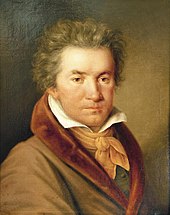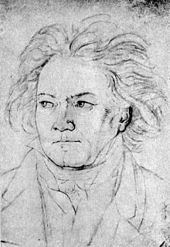Karl van Beethoven
[1] Following Kaspar's death in 1815, his brother Ludwig sought to take legal action against his wife, Johanna, for sole custody of her son, Karl.
Later, he would recall: "This I had my brother bring about since I did not wish to be bound up in this with such a bad woman in a matter of such importance as the education of the child.
"[3] After the amendment, however, Kaspar, drew up a codicil which stated: "God permit [my wife and brother] to be harmonious for the sake of my child's welfare.
[3] On account of this behavior, Ludwig enrolled Karl in the Vienna boarding house Giannatasio del Rio from 1817 to 1818, and the Pensionat Blöchlinger in 1819.
When Karl's mother attempted to visit him at his school, the director informed his uncle asking that she not interfere with his studies.
since my greatly beloved brother has helped me so often with truly brotherly love in the most magnanimous and generous fashion that he will in the future transfer the love so often shown me as well as the friendship to my son Karl and that I expect with full confidence and in full reliance on his noble heart; I trust that he will do everything in his power for the mental education of my son and for his further career and I know that my brother will not refuse this my request.”[2] Johanna brought suit against Ludwig three times in September and October 1818; each time, her petitions were rejected.
[3] Due to an error on Ludwig's part, the case was moved to the Vienna Magistrat and a hearing was held on 11 January 1819.
The court recognized the co–guardianship; however, when von Tuscher recommended that Karl be sent away, Ludwig broke off the friendship and regained sole guardianship.
On account of this, the Magistrat ruled against Ludwig, stating that Karl had been "subject to the whims of [his uncle] and have been tossed back and forth like a ball from one educational institution to another.
[3] Despite Johanna's plea to the Emperor himself, the decree remained, and Karl was sent back to the Blöchlinger Institute, where he immediately ran away and had to be returned against his will.
When one is young one does not see such things, but you will understand it much better as you get older..."[2] Karl's life with his famous uncle was greeted with complete misery, until he enrolled in the University of Vienna to study languages in 1825 at the age of 19.
Ascending to the castle Rauhenstein ruins in Baden bei Wien, armed with two pistols and gunpowder, Karl loaded both guns and pointed the first one toward his head.
[5] The news of the attempted suicide and request to be brought to his sister-in-law's house deeply disturbed Karl's uncle, Ludwig.
The day after he left for duty, Ludwig drew up his last will and testament, leaving his entire estate to Karl.
In 1868, Ludwig had to escape Vienna from both creditors and criminal court, by means of his mother's money a second time, and fled to Munich.
[7] This direct line of musical nobility so impressed the King that he gave Ludwig a healthy salary on which to live.
[6] While in America, Ludwig changed his name to Louis von Hoven, to separate himself from his famous surname and (as he disclosed to his sister): "[save me from] being continuously faced with annoying questions."
During his stay in America, Louis worked for the Michigan Central Railroad in Detroit,[8] began various businesses and found brief success as an inventor.
Marie van Beethoven found success as a piano teacher and concert pianist, touring the United States and Montreal.
The music critic for The New Yorker magazine, Alex Ross, states however that Louis "ran a scheme renting wheelchairs to elderly people at the 1876 Centennial Exposition in Philadelphia"[9] Louis and his family left America and were reported to have stayed in Vienna briefly in 1878.
One of the last recorded evidences of him is found in author Paul Nettl's article "Beethoven's Grand-Nephew in America" where he is said to have been seen in Paris in 1890, sick and impoverished.
It was thought that the place and date of his death were unknown;[9] however, a discovered note drawn up by the Hietzing Court in Maria van Beethoven's probate file reveals that Louis von Hoven (aka Ludwig Johann van Beethoven) died in Brussels on 15 October 1913.
Karl Julius did not attend his mother's funeral due to complications resulting from anemia, neurasthenia and malnutrition.
On 1 September 1917, Karl Julius was awarded his mother's final belongings: a ring, an alarm clock, and 27 Kronen and 31 Heller cash.
[6] Although all his next of kin were listed as "deceased", the probate file stated that his aunt, Karoline Weidinger (widowed), was supposedly still living.
Karl Julius van Beethoven, a grandson of the great master's brother, was born in 1870 in Munich ..." (Nueus Wiener Journal, 11 December 1917); "The relatives who attended the funeral were ... Dr. Raoul E. Wedinger, his mother Hermine Weidinger, and their daughter Elsa.
[12] In the film Immortal Beloved, starring Gary Oldman as Ludwig van Beethoven, actor Marco Hofschneider portrays his nephew.
The premise of the film's title concentrates on a ten-page letter that Ludwig van Beethoven wrote to an anonymous recipient: an "Immortal Beloved".





